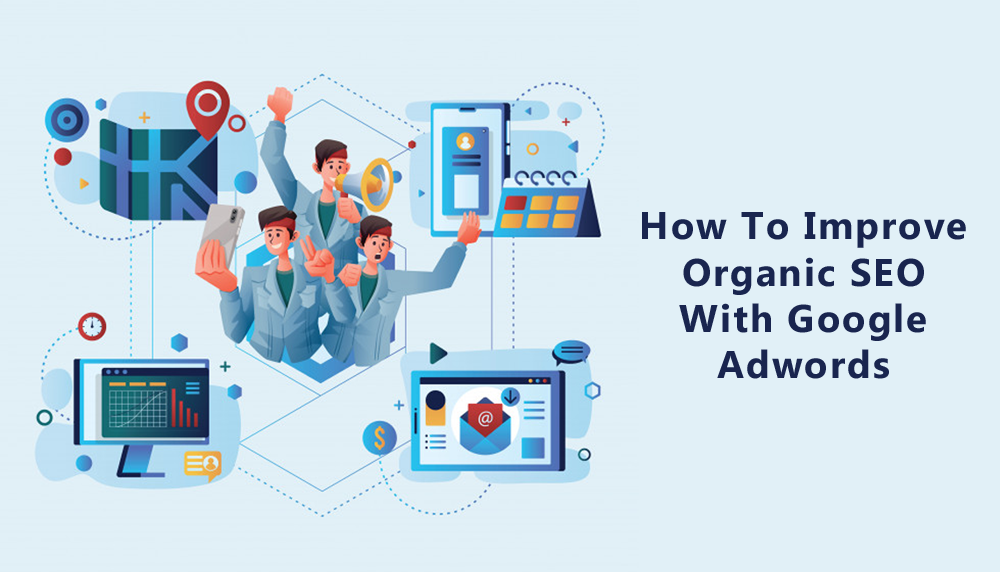Are you putting together a strategic Google AdWords campaign, hoping to see significant improvement with organic traffic and ranking? It is well worth your time to find out how SEO and AdWords work together or how Google AdWords help to improve organic SEO as the former impacts your visibility and ranking on search engines for key terms.
Google has stated several times that advertising with AdWords will not necessarily and directly improve organic search rankings. But there are more than a few ways you can adopt, which involves utilizing AdWords to enhance your SEO strategy significantly.
For instance, you may quickly utilize PPC data to get deep insights that will eventually carry over to organic search, thereby saving yourself tons of money and a lot of time in the process. You can set up an AdWords campaign, activate it, and then drive torrents of traffic at scale in one evening. SEO, on the other hand, can take up to 12 months to start seeing substantial and quantifiable results.
Let’s assume that it costs you $2,000 per month for SEO; by the end of 12 months, you may have spent up to t $24,000 before you even know whether or not your SEO tactics worked as planned.
That is all well and good, what if you end up ranking for keywords that do not bring in as much organic traffic as you desired? Or it brings in enough traffic but doesn’t result in sales?
However, you can utilize AdWords data in order to kick start a new SEO strategy. This is how SEO and AdWords work together as you will end up considerably minimizing the risk by testing ideas as well as creating proof-of-concept. You may also exploit your Pay-Per-Click data to run adverts in order to strengthen and reinforce an existing SEO strategy or organic search results.
Does paid search help organic search? That is what you will find out by the end of this article. By then, you will have discovered how Google AdWords help organic SEO.
Why Should You Utilize AdWords Data?
Most organizations that kick off their SEO strategy usually begin with innovative industry tools – such as SEMrush, Ahrefs, and Moz – that determine keyword targeting opportunities.
General SEO advice will implore you to search for relevant keywords with low competition but incredibly high volume. And then create content around your research in order to fully engage searchers.
But then, assuming the keywords are commonly searched for and easy to target, finding success should be a walk in the park, isn’t it? That may not necessarily be the case.
The industry tools mentioned earlier can indeed help you to quickly figure out how to drive massive traffic from search engines. But the only way traffic can be useful to you is if it results in conversions or sales. This is where AdWords data shines.
Do you know that you can make use of data from your PPC campaigns to analyze the terms that drive most conversions readily? You can unlock an SEO strategy that will deliver an incredibly high ROI (return on investment) from sign-ups to purchases.
Up to 50 percent of marketers have stated that their biggest challenge in terms of content marketing is lack of time. And since SEO strategies can take up a lot of your time, you may consider juicing up the strategy with AdWords.You can adopt strategies that have shown how Google AdWords help organic SEO.

How SEO and AdWords Work Together
Next, we’ll take a look at how SEO and Adwords work together.
You can utilize AdWords data and features to boost your organic search growth via the following ways:
Speed Up Your Results Using Remarketing
Retargeting or remarketing is the process of showing targeted adverts to those who have previously visited your website or engaged with your brand in one way or the other.
This is an exceptional and powerful tool you can deploy when going after the 98 percent of individuals that visited your website without taking any action or purchasing your services or products.
It is assumed that these visitors already know your brand since they have interacted with it in one way or the other. They are far more likely to respond to retargeted ads than random strangers on the internet.
Remarketing has been proven to improve SEO results in two distinct ways significantly:
- Get to know more about your prospective customers: When you analyze your remarketing list, it enables you to learn more about your prospective customers. You can leverage factors such as their long-term interests as well as what they are earnestly shopping for to refine the types of keywords and content you should be employing in your SEO strategy. You can get more information by logging into your AdWords account.
Check the top right-hand corner of your account and click the ‘Wrench’ menu. Then navigate to ‘Shared library’ > ‘Audience manager.’ On the left, you will see the ‘Audience Insights’ tab. Click on the tab, and you will pull up all the lucrative details when it comes to remarketing the audience of your choice.
- Re-capture or reacquire non-converting visitors: Research has shown that it takes about 5 or even more brand impressions before a potential customer becomes a paying customer by making a purchase, at least 80 percent of the time. Remarketing them enables you to get in front of your audience multiple times easily and cost-effectively. This also allows you to conveniently extract the most value from every one of your organic search visitors, especially those who do not convert immediately.
Remarketing has also been proven to enhance brand recall which makes it even more likely that they will diligently search for your brand name or eCommerce store much later via organic search.
Staying in the mind of your audience engenders trust, and they will be more than willing to share your content with their friends or contacts, thereby earning you lots of backlinks legitimately.
Still asking “does paid search help organic search?”, well keep reading to find out!

Ad CTRs (Click-Through Rates)
The click-through rate can be defined as the percentage of individuals who clicked on a particular ad, and it is one of the most important metrics to look at when determining how Google AdWords help organic SEO or how SEO and AdWords work together.
Typically, a high click-through rate (CTR) is an indication that the ad is well written. Lots of people have seen the ad and were convinced enough to engage and respond to it.
If you translate your high click-through rates right from your AdWords account to the organic search snippets, it will pay incredible dividends. A boost or increase in your organic search click-through rate will bring in more traffic directly from your existing rankings while helping you to improve your rankings as well. This will end up creating what is known as a ‘flywheel effect’ where you generate even more traffic.
This is because the click-through rate is one of the primary factors that ‘RankBrain,’ Google’s machine-learning algorithm, looks at in order to determine whether or not your website deserves better rankings.
But then, one needs to tread carefully so that you do not over-promise and under-deliver. In other words, take care so that you don’t optimize click-through rates at the expense of dwell time and bounce rate.
Check your AdWords account to see if you can find any trends, patterns, or common denominators of high-CTR keywords and ads. You may have to carry out some testing if you cannot find actionable insights in short order.
Search Terms Reports
Another excellent way of discovering how SEO and AdWords work together is by taking a look at the Search Term reports. Keywords are those phrases you target in AdWords while search terms refer to phrases that people or search engine users are actually typing into the Google search box.
The AdWords Search Terms report shows the precise phrases that people are entering into the search box, thereby triggering your ads. This will enable you to target those phrases with SEO.
You can see this when you head over to the ‘Keywords’ section in your AdWords account. Click on the ‘Search Terms’ tab located at the top in order to see the phrases or words that get tons of impressions. Find out the terms that are bringing your target audience to your website, which end up converting them into loyal customers.
When you understand and retarget these trends, you will have a much better perspective of how Google – and the searchers that use the #1 search engine – respond to your PPC campaigns.
Bear in mind – in your quest to learn how Google AdWords help organic SEO – that a successful search engine optimization strategy only targets keywords based on user intent and not only on search volume. For instance, short, highly competitive keywords may see several millions of ad impressions.
However, putting your primary focus on targeting these short keywords organically is not worth it, especially if people making those searches are not clicking through to your website and then converting into leads or paying customers. This is asides from the extreme difficulty of ranking high and well for super-competitive keywords.

One thing that is abundantly clear when it comes to off-site factors despite the absence of Google ranking factors: backlinks are highly essential.
Backlinko analyzed up to 1 million search engine results and discovered that URLs that take up the top spots on Google’s first page have nothing less than 200 referring domains that point backlinks at them.
However, building that incredible number of links to every page that you want to rank for on Google can be challenging. This is where Google Display Network data kicks in.
If you are already running display ads, you can take that data and use it to find excellent and remarkable link-building opportunities to improve your rankings significantly.
You can do this by going over to the ‘Placements’ report in a display campaign. Then check and click the ‘Where Ads Showed’ tab that is right at the top. This will reveal a list of websites that your ads have been displayed on, along with the performance of each.
Sort by conversions or clicks, and then consider whatever it is you see. Then for every entry that looks very promising:
- Click through the display ads to the website and check out whether or not the website has a highly engaged audience that could be potentially interested in your business.
- Then utilize any tool like Moz or Ahrefs to check out the domain authority of the website. This will give you a rough but excellent idea of how valuable a link from that particular website will be.
For websites that are very good, try and reach out so that you can obtain a backlink from them via guest posting or any other valid link-building method you can deploy. This is one great strategy to help with the question “does paid search help organic search?”
This is one of the easiest ways of finding relevant websites to generate backlinks from. It will enable you to get the most out of your PPC campaign data.
